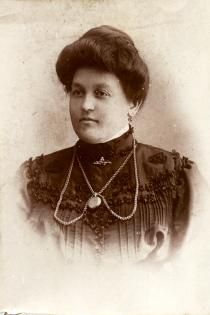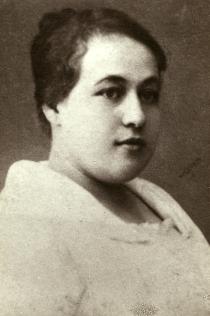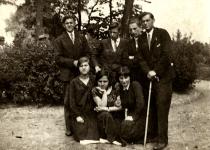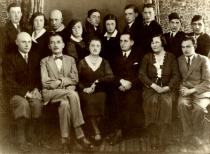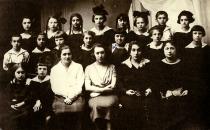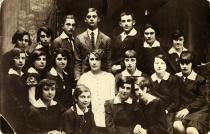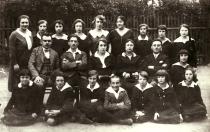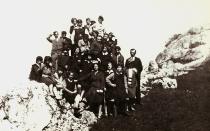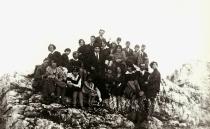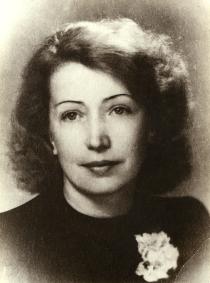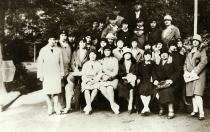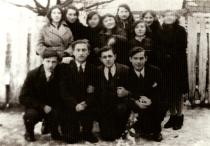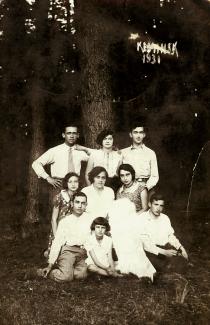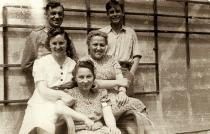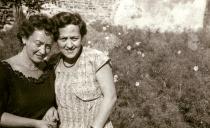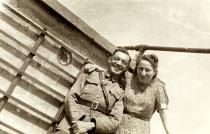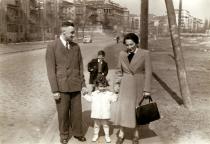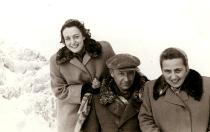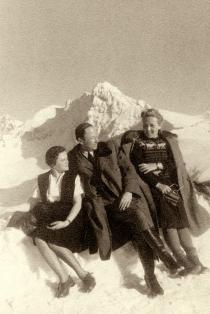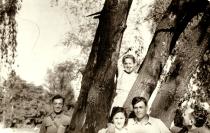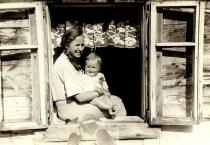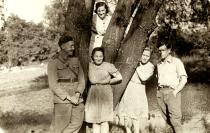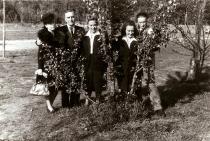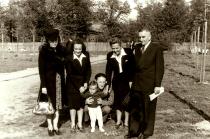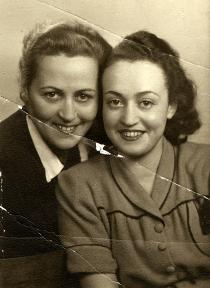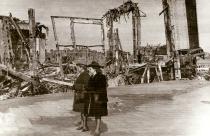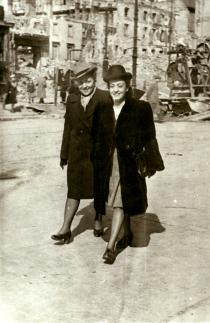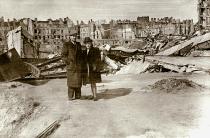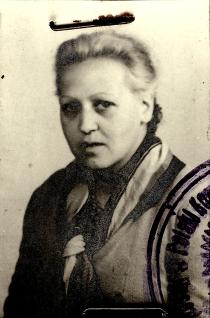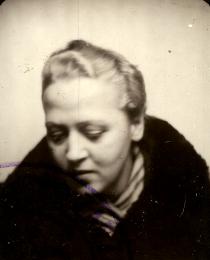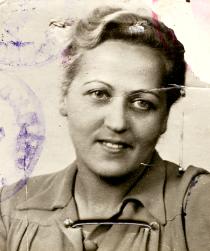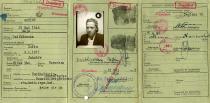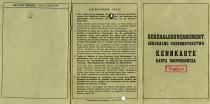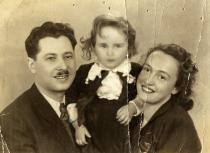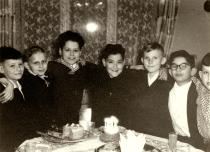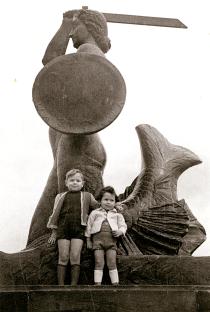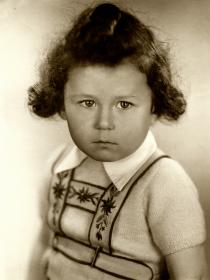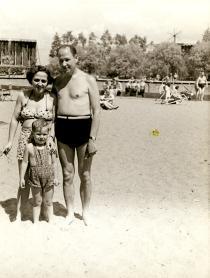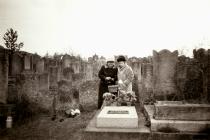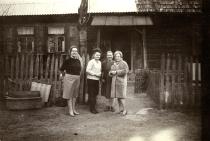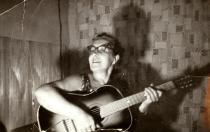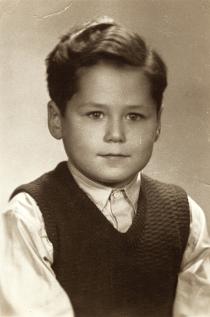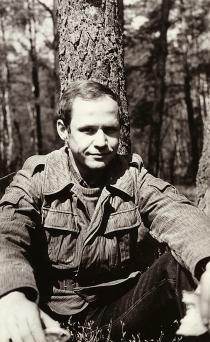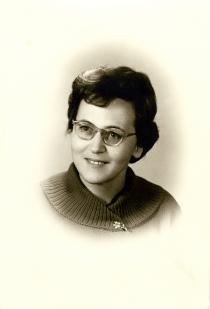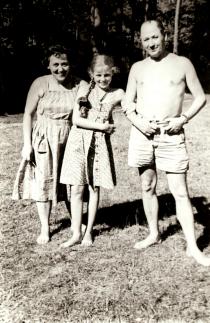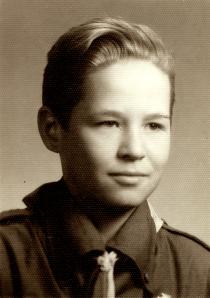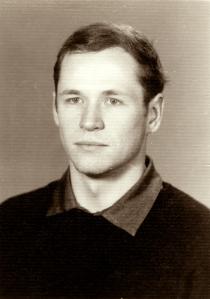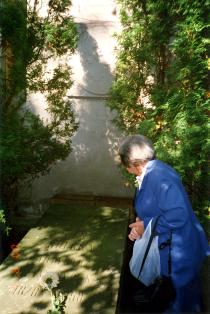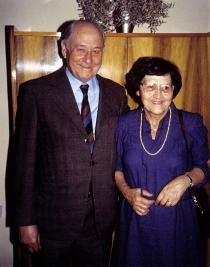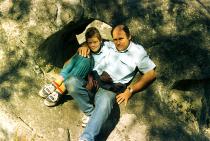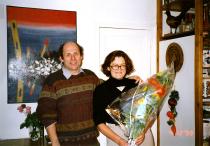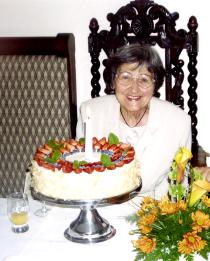
Apolonia Starzec
Warsaw
Poland
Interviewer: Marta Cobel-Tokarska
Date of interview: June 2006
Mrs. Starzec lives alone in downtown Warsaw. She is friendly, talkative and charming, although at times our conversation wasn't easy. My interlocutor doesn't feel attached to Jewry, perceives her pre-war family as assimilated, though her story reveals a somewhat different picture. Some subjects proved impossible to discuss at all, and sometimes Mrs. Starzec made the impression of deliberately avoiding certain questions. Despite that, the many disconnected and incomplete strands wove themselves into an interesting story.
My family history
Growing up
During the war
After the war
Here's my, let's call it, résumé. We lived in Radomsko [town in central Poland, some 150 km south-west of Warsaw]. It was my father's patrimony. My sister's name was Irena... I mean, she had a different name once. She changed her name to Irena during the war and it stayed that way. Before the war her name was Ruta. She was Ruta and I was Pola [short for Apolonia]. We were the only children. In terms of looks, I was more like my father, he was dark, and my mother was a blue-eyed light blond, typical Aryan, as they say. My sister had her looks. My childhood was good, indeed. Cheerful, without inferiority complexes of any kind; I had no idea of anti-Semitism whatsoever. The material conditions were good, at least until the crisis [Great Depression] 1.
My father's name was Mordchaj Dawid Bugajski. He had four brothers and three sisters. One of the brothers was called Salomon. They lived in Lodz, and then [during WWII] they moved in with us [in Radomsko]. The second brother was called Juda, the third one was my father, and the fourth one was Jakub. My father's sisters adopted their husbands' surnames. One had the married name of Lorie; she was a kind of liberated woman, and the other sister had the married name of Hercberg.
My father ran a large family business called Bracia Bugajscy [Bugajski Brothers]. They traded in flour, sugar, salt, things like that. I remember they leased a siding at the train station. I visited the place as a child and saw the wares being unloaded. There was also a wholesale store in the market square. Also a road-building business, and something else, I don't know what. In any case, they didn't make it. The whole thing went bust when the Great Depression came. My father's brother, Juda, committed suicide. He had a large family, a large house, and he was the head of all that business. His children were all grown up; he was much older than my father.
Was my father's family traditional? Yes. They spoke Yiddish. But neither did we visit them nor did they visit us. We didn't keep in touch. I felt more attached to my mother's family. I think they [my father's family] were all murdered in Radomsko. There is a cemetery there, a monument.
The most important person in our home was my mother, whom we loved very much, because she was a friend rather than a parent. She agreed to many things, but also required many things from us. She brought us up well. Her maiden name was Zelinger, Zofia Zelinger. She had an inferiority complex, she was obese; before getting married she strove for her parents to send her to Marienbad 2. They did send her there, but I don't know whether it helped anything. She was very beautiful, a typical Aryan. She was 16 when they married her: to a man from Radomsko. And so she married a Bugajski. How did she meet him? I don't know whether matchmaking was involved, I can't remember those things. She was less than 17 years old when she gave birth to me. And she died young, also [in 1940]. I was the first child, born 1st October 1914; they got married on New Year's Eve... I even had her ring, with the dates engraved.
My mother also came from a large family. And, unlike the Bugajski family, it was an assimilated one. I kept in touch with my mother's family. My mother comes from Sosnowiec [city in Silesia region in southern Poland, some 300 km south of Warsaw]. My grandmother - they say I had her looks. Zelinger. I don't remember her first name. I have a very vague recollection of her. I know they lived in their own house, a large one, because there were nine of them. Grandmother died when I was little. Did she wear a wig? I think so. That was the custom then. And my grandfather I don't remember at all.
In the house in Sosnowiec my [maternal] grandparents lived on the second floor. Lubomirski Park and the river Przemsza were nearby. The address was 2 Ludwiki Street. There were two balconies; you could spend Sukkot there, under the roof. There were quite a lot of rooms, and in the living room stood toys for us. I liked to go there because my grandparents really doted on me. Katowice was not far away, it wasn't part of Poland yet [Katowice was incorporated into Poland only in 1922]. I remember them taking me there [to Katowice], buying me nice clothes. Sosnowiec was poor, and Katowice was different, German style; I returned all elegant.
I don't remember all uncles and aunts. Zygmunt, my mother's youngest brother, lived in France. I remember him coming to our town before the war. When in Poland, he visited us very often. I was in my last year of gymnasium [eighth grade] when he took me to Warsaw for a sightseeing tour. I was 16, just a teenager. I didn't like to dress up, I liked my school uniform. He showed me everything there was to see in Warsaw. I remember me passing through all those revolving doors. Everything was amazing. He showed me the cabaret, the Qui Pro Quo [famous Warsaw cabaret, operating from 1919-1931] and the Morskie Oko [cabaret, operating from 1929-1933]. And if that weren't enough, he took me to an ordinary revue. I'm sitting at the table, dim lights, a dance floor. I was very embarrassed; he had to go to the toilet, left me alone. A young man comes up to me and asks me to dance. And I was so frightened. 'I'm not dancing, I can't!' and I yelled at Uncle for bringing me there. That was my first encounter with Warsaw.
Uncle Zygmunt was very handsome. He was a man who enjoyed life. Elegant and handsome, he long persisted in bachelorhood. His first wife was Aunt Yvonne, as we called her. She left her husband to be with him. She wasn't Jewish. She kept him in hiding somewhere with her relatives in the [French] countryside. She worked as an editor. Uncle Zygmunt came to Poland once, quite accidentally at the very time when I was giving birth to my elder son. It was 1947; they were taking me from the delivery room to the maternity ward. I look, here comes my husband with some gentleman. The first visitor I had after delivery. He died of a heart attack, in 1971. At the table in his bridge club. Had himself cremated. His ashes rest at the Père-Lachaise cemetery [French: Cimetière du Père-Lachaise, Paris's largest and most famous cemetery].
My mother had a sister named Sala. She married a certain Sandomierski, also from Radomsko. Her other sister, Cesia, lived in Bedzin [town in Silesia, near Katowice and Sosnowiec]. She married some Hasid 3, named Zeligier, a similar name. They had a son Zygmunt, he came to us for the summer holidays, and I also spent my vacations there sometimes. There, in Bedzin, I saw the Jewish ghetto [quarter] for the first time. My aunt wore a wig, her husband a beard. Zygmunt had been through the cheder. It was a very religious Jewish family, very different than ours. The boy felt a bit like a bird in a cage. I remember he liked to come to us because at least he could taste some freedom. And get a taste of a different world. And I went there because, you know, it was right to visit Auntie from time to time. Zygmunt had a sister, her name was Pola, too, I think. He was the eldest grandson, I was the eldest granddaughter. We were roughly of the same age. He craved for all that he lacked, the contact with Polish culture, and I ran away from the culture he was raised in. Everything irritated me there.
There was also Uncle Bernard. He was very handsome, blond, like all of them, one of the eldest sons, the most intelligent one. He married Zosia [diminutive for Zofia] from Lodz, a beautiful girl. They eventually took over the [grandparents'] house in Sosnowiec. The other brothers and sisters moved out elsewhere. And reportedly they were taken from that house [by the Germans during the war]. They were a very loving couple. I actually attended their wedding in Lodz. My mother sewed special dresses for us. It was a wedding under the chuppah. And they had two sons: Mietek [from Mieczyslaw] and Henio [from Henryk]. Mietek was born with a harelip. And he was so terribly mean. His younger brother was such a cherub, talented, cheerful, joyful... and then he with the harelip.
I was born and raised in Sosnowiec under my grandmother's supervision, because my mother was emotionally very strongly attached to her family home. I spent more time in Sosnowiec each year than at our home. The other grandchildren came, too, had their toys there, I had a beautiful talking doll, Zygmunt Zeligier had a rocking horse in the living room... He was the eldest of all the cousins; he died recently. He had a wife named Adela and a boy. They lived in the States, in Washington, DC.
Now let me tell you about my town. Our street in Radomsko was originally called Strzalkowska. It led to a village called Strzalkow, but later it was renamed to Legionow. The house we lived in was very large. It was owned by some Jew. From the World War I period I remember those massive samovars standing in the large courtyard. There was no sewage system, a waterman supplied water. Later a sewage system was installed. The house was very big. One wing was occupied by an elementary school, and above it were apartments. And in our wing the whole second floor was occupied by a private gymnasium that I later attended.
We lived on the third floor, in a suite of four connecting rooms. From my balcony I could see a mill in the distance, rye fields where we played truant. I was very angry [to be living so close to school] because if I did anything bad, they would immediately send me home to bring my mother for a warning talk. And I envied those who lived farther away. The house is still there. When I came after the war to see how things were, it had already been turned into a hospital.
The town had 30,000 inhabitants. It was surrounded by predominantly German settlements. There was little industry. If anything, it was foreign-owned, the metal industry, for instance, was Belgian. Besides that, there were some private-owned steel mills.
There was also the Witte Wunsche factory. [Ksawery Wunsche i S-ka: a furniture manufacturer, founded in Radomsko in the early 20th century, operated until the end of WWII. Nationalized in 1945, operated afterwards as an independent enterprise under the name of Fabryka Mebli Gietych Nr 2 (formerly Wunsche).] Wunsche's son was my friend and peer. He went to the boys' gymnasium. It was a public school. He was a bit my elder, went to the parallel grade, the so-called German school. But we were members of the same youth organization, MOPR 4. He was also a factory owner's child. During the war, he did a lot for Jews. His father was a Volksdeutscher 5 or a Reichsdeutscher. The young Wunsche also helped the organization, which had a left-wing profile, during the war. He married a Jewish girl. A beautiful girl, he fell in love with her even as a student. And they live abroad.
Politically, the town was under the sway of the PPS 6. All those [left- wing] organizations ruled supreme, and even in the town council the PPS had a majority. The fire brigade was the town's most important organization. On the national holidays, 3rd May or 11th November, we marched in our school uniforms and sang songs. There was this square, called the 'calf pen', young people had dates there [Editor's note: A meeting point for young people, called that because young boys and girls stared at each other 'like calves' - a Polish expression]. And there was the market square. In the market square stood a beautiful old church and next to it the town hall.
The pre-war Radomsko has been very beautifully described by my schoolmate Lola Szlamkiewicz [actually Lea], married name Grebler; she's dead now. She was in Russia when the war broke out, not, like myself, in a ghetto [in Warsaw]. She survived, and I have all those school photos from her. There [in Russia] she met her husband, Grebler, who came from Stanislawow [town in south-eastern Poland, today Ivano-Frankivsk in western Ukraine, some 500 km south-east of Warsaw]. And she became his wife. She lived a beautiful life at her beloved husband's side. I have her book about the Jewish community [of Radomsko], a community I had few affiliations with. [Szlamkiewicz-Grebler Lea (1991): Ryby z nieba. Przedswiateczny cud. Opowiadania i humoreski z zycia Zydow w malych miasteczkach w Polsce w latach 1925-1938. (Fishes from Heaven: The Holiday Miracle. Stories and Humoresques about Jewish Life in Small Towns in Poland 1925-1938), Haifa]
Lola came from a very poor family. My elder, she completed an elementary school. She taught herself. She was an orphan and she was brought up by her elder sister, whose husband was a shoemaker. They lived at the market square, and on warm days the shoemaker would work in front of the shop. They lived in terrible poverty; there was a lot of Jewish poverty around. She left town and went to Warsaw to study biology, which she completed. Later, when the war broke out, we lost contact whatsoever.
After the war we looked for each other. I no longer remember the details, but, in the end, we [Mrs. Starzec and her husband] brought her from Stanislawow to Warsaw. We secured an apartment for her, and even a job. But they didn't want to stay in Poland. Even though they had good conditions here. They immigrated to Israel. Their children were born there, two wonderful children. I'm in touch with the daughter, her name is Ania. She lives in the United States. The parents were already of age, needed care; they brought them to the States to live with them. They both had cancer.
There was a movie theater, the town's only one, alongside it a park, where dancing parties and all kinds of events were held. There were also balls at the town hall; I didn't go because I was too young, but my cousin, who worked as an accountant for us, went, and so did my mother. In the cinema they screened silent films, but there was a band downstairs, like in a philharmonic, providing wonderful musical illustration to the movies. There were the stalls and the balcony, and that was a great thing. Those movies we were allowed to see we did go to see. The first sound movie I saw was in Czestochowa [a city close to Radomsko], with Al Jolson, a black singer [Editor's note: a white actor wearing blackface]. I remember he sang beautifully. [Al Jolson, real name Asa Yoelson, (1886-1950): American singer and movie actor. Played in the first full-length sound movie, the 1927 Jazz Singer, dir. Alan Crosland, a sentimental story about the son of a synagogue cantor who against his father's will, becomes a jazz singer.] Mother took us under her arm, me and my sister, and we went to Czestochowa. It was 50 kilometers, you went by train. I was proud because express trains stopped in Radomsko! They don't these days.
The market day in Radomsko was Thursday. The farmers brought their produce, the prices were low. It was the so called 'price scissors' period: farm produce was very cheap whereas industrial goods were very expensive. During the Great Depression, peasants would split a match into two to save. Matches were expensive; there was a [state] monopoly. Salt, sugar, were expensive. And an egg cost very little, a few pennies. You couldn't buy a box of matches for one egg. You had to sell many eggs or a lot of butter or cheese to buy salt, for instance.
There were many stores and cake shops in Radomsko. There was a cake shop where they sold good cream cakes. Or chocolates. There were stores with plenty of food products to choose from. They were cheap. The stores offered all kinds of exotic fruit. I remember a holiday when you eat a lot of dried fruit, New Year or something. [The interviewee probably means Purim]. You bought pineapple and dates - fruit that in People's Poland 7 were impossible to buy for a long, long time. Stores selling dried fruit and exotic fruit. The domestic ones you didn't buy at the market, of course, but went to an orchard and bought directly from the tree or shrub [i.e. from the farmer]. There was a hospital on our street; the director was Doctor Stanislawski. His wife had a beautiful garden; we went there to buy strawberries.
We didn't go to the market for shopping but had it brought to us by [a woman] from the countryside, from Kobiele [village near Radomsko]. She became friends with my mother, and one day she says, 'I'd like you to hire my daughter.' Jania was 16 when she came to us. To apprentice as a housekeeper, in the kitchen. She was a maid, a 'servant,' you called it those days. Janina Koper. She stayed with us until the war. She came from Kobiele Wielkie, the home town [rather village] of the writer Reymont, and she was a very good student [Reymont, Wladyslaw Stanislaw (1868-1925): Polish author, best known for his novel 'Chlopi' (The Peasants), awarded the Nobel Prize for literature in 1924]. She was our friend. I had already flown out of home and she stayed with my parents until the war.
A washerwoman came to do the washing. The whole thing lasted for three days, and then you hung the laundry in the attic to dry. Then an ironing lady came, so, put shortly, it was a major operation, the big washing every two months. And then everything had to be starched, it was all cotton, no artificial fabrics, those were unknown.
I didn't know hunger but rather affluence. Well brought-up, learning to play the piano. At first, [my parents] insisted on me playing the violin. It didn't work too well, so I switched to the piano. A pharmacist's wife lived next to us. My sister and I went to her for lessons. We were both brought up as girls from a good home.
The first radio I remember was when I was in the final year of gymnasium. It was a large apparatus, with massive batteries at the back, you listened through headphones. There were lectures for final-year students. Friends would come to me, girls and boys, and we would listen. I know that at the time, I was 16, we were one of the first to have a radio.
What can I say about religion? We observed the holidays for the sake of my father's parents. They lived on the same street. People talked that we didn't observe the kashrut... and my father never ignored what his parents said. I knew them as very, very old people. They didn't visit us often. I remember the food aspect of the holidays. On Purim, my mother would bake beautiful things... My father observed the food regulations, taught us certain things. That is, for instance, you eat only matzah during the holidays. I remember how a friend tempted me to eat a piece of bread on Easter, and my father saw it. It was the first and only time that he gave me a spanking for publicly disobeying [his orders].
For Pesach, my father recited something, and I, as the eldest child, in the absence of a boy, asked him the questions [the mah nishtanah]. He answered me, and so on. I was little, I barely remember those things. I remember the Easter table, covered with horseradish roots [maror]. But, at the same time, there was ham. When I visited a [Christian] friend of mine, I saw the Christmas tree and found I liked it very much. And so there was also a tree at [our] home. But it stood in the last room, ours, in the mezzanine behind the door, hidden in case someone paid us a visit.
My father felt attracted to Jewishness. He read a lot. And he spoke Yiddish. Yiddish, or Hebrew, I don't know. And my mother - not at all, she was completely liberated, and it was her who ran the house, which is why I never learned many of the things [connected with the Jewish religion and tradition]. If my father went to the synagogue, it was on Judgment Day. My mother - never! And he fasted. My mother did not, nor did we. My birth certificate stated my religion as Jewish but my nationality as Polish. That's how I identified myself, that how I was brought up, in Polishness. I didn't know the [Jewish] language because we didn't speak Yiddish at home.
We had this favorite holiday place called Kamiensk, near Radomsko, where we regularly spent the summer holidays. And one Friday I was cycling back from there to Radomsko, it wasn't far, ten kilometers. I'm passing the synagogue and I see small boys starting to throw stones at me, that I'm offending their feelings. And I didn't realize, didn't know it was forbidden to cycle on Friday night. I don't remember my mother lighting the candles, ever.
I went to kindergarten in Radomsko. And then I went to gymnasium. I was always the youngest in the class. I never went to elementary school. There were several gymnasia in our town. Two for boys, one for girls, and the coeducational private one, ran by Mrs. Weintraub. Ludwika Weintraub came from Piotrkow [Piotrkow Trybunalski, town some 120 km south-west of Warsaw], I think. She was the school's owner and headmaster, a Jewess. Mrs. Mittleman, our craft and design teacher, a doctor's wife, mother of two daughters. A wonderful woman, she taught us many things, the useful ones. A professor named Brumberg. He taught biology, if I'm not mistaken. And Mrs. Palusikowa. I think she taught us math. There were also religion classes, in Polish.
Of my schoolmates I remember, for instance, Blumsztajn senior, Sewek's father [Sewek - short for Seweryn; Seweryn Blumsztajn, one of the founders of the underground KOR Workers Defence Committee, since 1989 editor at the 'Gazeta Wyborcza' daily]. We lived in the same house, us on the floor above them, and we completed the gymnasium together. Other schoolmates: Sznajder, a very talented boy, Plawner, he reportedly survived in the Czestochowa ghetto 8. When we grew up a bit, we became involved in other matters, not only our private ones. Community work. Some were Zionists, members of the so-called Shomr [see Hashomer Hatzair in Poland] 9. Brumberg was the leader of the Hashomer Hatzair guys. I didn't belong anywhere because I wasn't interested in the Jewish movement.
When the time came to take the school-leaving exams, I, being the youngest in the class, had to write to the board of education to be entered. The exam was very difficult. A humanistic-profile gymnasium, with Latin, with German. And I went to Cracow to study. I studied in the years 1930-1934. I studied chemistry. I originally wanted medicine but I didn't get in. The numerus nullus had already been introduced [see Numerus clausus in Poland] 10. Only doctors' children could take some kind of competition exam. Well, I had no chance of passing that, of course. So I took chemistry because in the first year the subjects were the same as in medicine, and I thought I'd eventually move. But I didn't. I stayed, studying the so-called physical university-level chemistry. I enjoyed the life in Cracow and I endured until the third year.
The chemistry department educated future school teachers. The industry was very underdeveloped; there were virtually no chemical plants, only the Moscicki factory [Moscicki, Ignacy (1867-1945): president of Poland from 1926-1939, chemist, founder of the State Nitrogen Compound Plant in Tarnow]. Many students studied forever, the so-called 'iron' ones; there was no requirement to complete your studies within any specific time. You could prolong forever. Unemployment was rampant, so students preferred to stay in the university for as long as possible, enjoy the reduced public transit fares, other discounts. School teachers weren't paid well either. In public schools they were paid better, but in private ones - poorly.
I tasted those big cities like the bumpkin I was. The studies were free of charge, we paid only the lodgings. I rented a room together with two other girls. There was antagonism between the [former] Congress Kingdom 11 and Malopolska [see Galicia] 12. The latter believed people from Congress Kingdom to be slobs, and we often had conversations like: 'Where you from? 'From there and there.' 'Oh, we can't rent to you because you're slobs.' And the place was dirtier than anything I had ever seen...
On the same street, Dunajewskiego, the PPS had its office. I remember a wonderful PPS rally and a fantastic speech delivered by Drobner [Boleslaw Drobner (1883-1968): socialist activist, Member of Parliament in communist Poland]. A face emanating with spirituality, dark hair, dressed in a Mao style uniform [Mao Zedong (1893-1976): Chinese communist leader, first president of the PRC, wore a characteristic uniform imitated by leftwing activists all over the world]. And when he spoke, it was very convincing. That was my first demonstration, May Day.
I experienced the bench ghetto 13. That was what attracted me to the socialist movement. Young people had strongly leftist views then. At university [Jagiellonian University] 14, there was an organization called Zycie Akademickie 15, and a socialist organization, the ZNMS 16. We had discussion meetings, because, apart from your own courses, you attended all other interesting lectures. The fellow students would gather, we had our own premises. The University had exterritorial status; the police wasn't allowed to enter. Nor did they ever arrest anyone. And various speakers came to deliver lectures. Meetings were organized once a week together by Zycie and the ZNMS, on subjects literary, political, whatever we found interesting.
One of the first speakers I remember was Cyrankiewicz 17. Wonderful, marvelous, handsome, lean, blond [Editor's note: everyone remembers him bald from the photographs]. He spoke beautiful Polish. He was from the ZNMS. We also invited writers, men of letters. One day, for instance, we were visited by Kruczkowski [Leon Kruczkowski (1900-1962): chemist, left- leaning writer and essayist]. But then there would come the endeks 18, the kind of boys that you'll also find in Poland these days [see Mlodziez Wszechpolska] 19... the ZPND and the Youth Legion [far-right youth organizations]... and they would start the 'Zwischenrufe' [German for 'interrupting shouts'], trying to break up the meeting, prevent the debate. They would also throw rotten eggs at the speaker to force him to leave. That's what they did with Kruczkowski. The meeting had to be aborted. They were a militia, members of the fraternities, student corporations 20.
There's this rhyme by Szenwald [Lucjan Szenwald (1909-1944): poet, communist activist], it goes like, 'czapeczka, laseczka, akselbancik, bydle wlane korporancik,' ['a cap, a cane, an aiguillette, here's the frat boy, a drunken lout']. The 'aiguillette' because they tied sashes on their shoulders. The cap and the cane, the cap often properly trimmed. They staged anti-Semitic riots, organized the bench ghetto and disrupted our meetings. We also had a militia of our own so they fought. And so much for a discussion, for a meeting.
And we did prison time for socialist activism. The university year was divided into trimesters; there was more vacation than normal life. After each trimester we went home for three weeks. And we changed the lodgings every time to save on rent. We didn't live in a dorm because there were few dorms, and chiefly for low-income students. Friends came to us to say goodbye because we were going home for three weeks. And suddenly the police arranged a frisk and, in 1934, in the apartment where I lived on Starowislna, I was arrested for alleged subversive activity. For being anti- state... And we landed in jail. To serve time was called 'kiblowac,' from the 'kibel,' the bucket that stood in the corner where you relieved yourself.
My mother attended every day of my trial. It was a great blow for my parents, but that's how we paid back for all the goodness that we had received. Two years in prison. And my husband, who was tried alongside me, received six years. I was expelled from the university, stripped of my civil rights. I was released in 1936 and started living on my own. You had to work, and unemployment was very high. It was the Great Depression period.
Radomsko ceased to be my home, it was only out of sentiment I went there. I remembered my childhood with great fondness. But in fact I no longer lived in Radomsko. It was a great embarrassment for the family that the daughter did time in prison, ruined her own life. In Radomsko, they viewed everything from a different angle. My parents were neither communists nor socialists. They weren't even Zionists.
Upon being released I first spent some time in Sosnowiec. Then I went to Warsaw. I lived at 56 Nowolipie Street, in a very beautiful, large house, as a subtenant, with Mr. and Mrs. Berger. Those were young, but religious people. I wasn't familiar at all with all those Jewish regulations and restrictions. I was surprised to see a young man scrubbing his face instead of shaving, because Jews weren't allowed to shave. Or, for instance, he calls me from his room, 'Mrs. Pola, Mrs. Pola, can you come here for a moment?' I enter, it was Friday night. 'Where are you?' I ask and I turn on the lights. And he says, 'Thank you.' I didn't even know that [on Sabbath] you aren't allowed to turn on the lights [i.e. perform any work].
I worked in the Alfa confectionery plant, on Mlynarska Street. Some relatives of Samsonowicz [paternal cousin], who were accountants, recommended me. The factory was owned by Jews named Wajdenfeld. They were two brothers who started with two bags of sugar, and eventually worked it up into a business with 400 employees. I worked as a bookkeeper, in the office, clattering away on the typewriter, learned some basic bookkeeping and that's how I made my living.
In 1939 I went on leave for the first time, to a summer resort, for two weeks. To Zielona near Jaremcze. Areas that are now part of Russia. [Jaremcze, summer resort near Kolomyja, today western Ukraine]. We went hiking in the mountain; it was the so-called Eastern Beskid Mountains, very beautiful. And then, towards the end of my leave, the unrest started in the border areas, in the north. And you felt war in the air. Everyone was packing up and I left, too.
On my way back to Warsaw I dropped in on my mother and sister who were on vacation in Kamiensk [near Radomsko]. And my sister asks me, 'Tell me, if there's war, will it be possible to buy things? Will the shops remain open?' 'I have no idea,' I said, 'like you don't.' 'Perhaps you'll stay with us?' she asked. 'No,' I said. By then I had become almost the sole provider for the family, their finances were poor. I was helping them and I didn't want to lose my job, no one had any idea what war meant. I said farewell to my parents and returned to Warsaw. I left them, and the next time I saw my sister was when she came to visit me after our mother's death.
Before the war actually began, there were preparations, fake alarms, that kind of thing. There was a nurse in every house, with a first-aid kit, to help if need be. I also received first-aid training. To prevent the Germans from entering Warsaw, we dug trenches in the Smocza Street area. I later saw what use those trenches turned out to be... when the motorized [German] army rolled into Warsaw [on 30th September 1939]. They didn't have a single horse... first came the motorcycles, then the tanks.
The first air raid. I was downtown, on Marszalkowska. Doing some business, and suddenly - the alert. We knew what to do. Jump into the nearest gate, because in every house there was a civil defense committee, there was a basement to hide, gas masks... So we're crowding into the gate. Suddenly we hear - the swish of falling bombs. This isn't an alert, this is for real. 'Here we are!' they demonstrated. [The first German bombs fell on Warsaw at 6am on 1st September 1939. They hit working-class apartment blocks in the Kolo and Rakowiec neighborhoods. Ms. Starzec must have remembered the bombing on some other day].
In the meantime, they seized the whole of Poland. Warsaw defended itself until the very end. I was still able to call my parents but soon the telephones were cut off. When the war started, I demonstrated with others in front of the French and British embassies - come help us! Starzynski, the president of Warsaw, a decent, wonderful man, ran the defense effort 21. He gave instructions until the last moment, ordered the men to evacuate from the city. We received all that because we had a radio at the factory. But when the daily air raids began, they didn't let me go anymore.
As long as the [Warsaw] ghetto 22 was open, I went to work, because it wasn't far, in Wola. They no longer paid us in money but still they paid us in kind. Chocolate products, couverture, that sort of thing. The factory had its own water intake, own power plant, and its employees formed a superb team. The owners had a brother-in-law, Kostrzewa, who wasn't a Jew. He later became the plant's Treuhänder 23. They both emigrated to America later. The factory had huge basements with big stocks of sugar, condensed milk, and all kinds of ready products. And when the war started, they didn't lock that away. There was a wide entry gate, they opened it, and people queued up for those products. They sold everything out to the last piece of candy. I slept at the factory in case of an intense air raid. There was terrible hunger. People cut [dead] horses in pieces. The stores were empty, water had been cut off; you took water from the Vistula. There was no electricity, everyone used carbide lamps.
In September 1939 [3rd September], the Germans entered Radomsko. And on 13th April 1940, my mother died. She had angina pectoris. There was no talk of any ghetto at that time, of no armbands... [Editor's note: the Radomsko Ghetto was closed on 20th December 1939; see Armbands] 24. The Wehrmacht 25 soldiers commandeered brass door knobs for cannonballs. My mother saw those Germans and fainted. And they never roused her back. They were worried themselves what to do with the problem. I was in Warsaw at the time and they [the family] hid it from me. My father got a job at the post office and he sent me packages. Those packages were brought to me by Kierocinski, a neighbor, every week. And there was always a letter from my mother. The last time he came, there was cake in the package, everything as usual. 'And where is the letter?' I asked. And he blurted out, 'You know, your mother felt a bit ill, she fainted.' 'But she's alright now?' She was dead by then, but they just prohibited him from saying anything, because it was no longer allowed to travel by train [and the family was afraid Ms. Starzec would try to get by train back to Radomsko].
I had a bad feeling, why has my mother not written me, what is he saying, she fainted? The cake is there, but no letter... I said, 'I'll go with you, when do you go back to Radomsko?' 'Tomorrow, perhaps the day after tomorrow.' It was just an intuition, a nasty feeling that nagged me. I went to the office at Teatralny Square that issued travel permits, and, surprise, I got it. I must have appeared truthful, that something had happened to my mother, I was anxious, needed to go and check.
I arrived in the town, took a droshky to the house, no one went out to the balcony. Well, something's wrong. And at this point my sister and the others run out of the house, all in tears. 'What's up with Mama?' 'She's dead.' She had already been buried. With Jews the dead are buried immediately. My mother is buried at the Jewish cemetery. My sister and I put up a gravestone after the war, not knowing anything about our father, how he died. I think he went with one of the transports, so he rests there symbolically with our mother's ashes. April 13 is the anniversary of our mother's death, a date we have always remembered.
And so I returned to Warsaw. My sister came to me. I still lived with the Bergers, they had two little babies. There was a basement in the house, and [during the relocation action carried out daily between July and September 1942] you could go down there. The Germans entered the ghetto and told everyone to gather in the courtyards, assisted by the police. They didn't go up the stairs because they were afraid of typhus which at the time was rampant in the ghetto. We, acting on intuition, either went down to the basement or not. Grandmother Berger, for instance, climbed into the mezzanine with the children. The entrance to the basement was hidden, children were the first to go. You had to crawl into the shelter which, until the alert was called off, remained bolted shut. And I remember to this day what gave me the horrors then: that I'm in a dungeon and I cannot leave it through that small exit. And the conditions in that basement were horrible. The crying children...
My sister and I went through many such alerts. And the transports kept going until the very end [the ghetto's liquidation]. The last transport during our stay in the ghetto took place when few people had been left [see Great Action] 26. We had realized by then that no one would stay in the ghetto. We had to leave. It was high time. My sister hesitated, she was afraid [to go], was all nervous, her face reflected fear and anxiety.
We worked in the so-called shop 27, a furrier's shop on Nowolipie. We made fur coats for the military, for the German army in Russia. The so called Schultz shop [probably Schultz & Co. at 80 Nowolipie Street, or the Fritz Schultz shop at 44/46 Nowolipie]. We had the 'Ausweise' 28; that was supposed to help us survive. And, indeed, it did. [During yet another action] they told us to take food for three days and clothing. And so we went. A procession, like in the movie, it was terrible, people had taken whatever they could with themselves, now they fell under the burden of all those bundles. We didn't have much, just a change of underwear and that's all. People left everything along the road until they got to the Umschlagplatz 29. And there was a whole campsite. With fires, tents...
And so the selection and segregation began. We had to go into the line, with those 'Ausweise' of ours. You showed your papers and you went either this way or that way. We saw some friends, acquaintances. There was a girl we knew, with her parents, relatively young ones, and her husband. Our friends, neighbors. And, before our very eyes, the parents were taken to the side, i.e. to the transport, and the young ones were let through, because they had 'Ausweise,' like us, so they were still useful, fit to work.
In front of me there was a woman with a little baby. That's cruel, but I'll never forget it either. Because they let her through, but only without the baby. And she left the baby because she wanted to go through. Humans ceased to be humans. All ethical principles and human feelings had been suspended. It was a traumatic experience for me. That was the kind of scenes I saw. I was together with my sister, but we were young, had the papers, and they let us through. And so we returned to the apartment at Nowolipie. We met Grandmother Berger there, she had hidden with the children... the whole family had stayed.
By then, the Russians had started responding, the 'Stalin Organs' [slang military term for katyusha rockets; in August and September 1942, Soviet long-distance bombers carried out air raids on numerous Polish cities, including, several times, on Warsaw]. A German in a Wehrmacht uniform sat next to me in the shop. 'Why do you go obediently like that, why don't you rebel against what's going on?' he asks me. He was our ally! Not all Germans were the same. That I also remember. And the role of the [Jewish] police 30? They weren't nice. They weren't good [people]. The Germans kept them until the last moment, but in the end they also went to the transports.
One time there was an alert and we went down to the basement. In the apartment we had some food products - some flour, groats, things like that. We had an iron stove in the room, because it was terribly cold. And on that stove we cooked soup, [so thick] the spoon stood in it. We come back [after the alert] and the food's all gone, stolen. Because the Germans had the policemen go and check whether anyone had stayed back in the apartments. And on top of that those policemen stole from Jews. That was nasty. Poor guys, they thought they would save themselves that way. They didn't. Which doesn't mean that all of them were like that. Such situations can occur in any community. Those are difficult things. Unfortunately. I remember the actions undertaken by the head of the Judenrat 31.
Donations were organized to help the refugees because the ghetto was hugely overpopulated; people were being brought from everywhere. [The inhabitants of areas around Warsaw, so-called 'refugees,' were being brought to the Warsaw ghetto, and their material situation was extremely poor]. They placed them in all the synagogues, they lived in terrible conditions. You couldn't cross the street, not to rub against one and catch a typhus louse. The poor ones no longer cared about life. Even though it was after curfew, they went out into the street and cried, 'Drop us some bread!' It's the first time I'm telling anyone about it, I'm not sure I should be.
But we had friends [Poles outside the ghetto] who cared for us and at the right moment pulled us out. They told us to leave the ghetto, we obeyed. A lady came with messages from them. Her name was Rozalia Solecka. Much older than myself, she knew me. And she knew I was from Radomsko, like her, only she wasn't [in the ghetto] because she was married to a non-Jew and lived in Zoliborz [a Warsaw neighborhood].
In January I went out [to the Aryan side] and in April [1943] they started burning down the ghetto 32. I knew I had to place my sister somewhere. Myself, I often didn't know in the evening where I'd spend the night, who'd offer me shelter. Though I had the papers, I didn't have a place of my own; I didn't want to expose anyone to danger. But I had some experience in underground activities and I was calmer inside. My sister couldn't hide the fact [she was Jewish], had to be pulled out of the ghetto almost by force, she kept saying, 'I want to die with the others.'
My sister was placed with a family named Skalski. Together with thirteen other Jews, all in a single concealed room. In Praga [a neighborhood in right-bank Warsaw], on Zabkowska Street, near the Rozyckiego market. Placed with a janitor who had been relocated from the ghetto [before the ghetto was closed, all non-Jews had been relocated elsewhere] and given an apartment in Praga [instead]. Three janitors were supposed to live in that apartment, each in a different room. But the other two had relatives in the countryside and didn't use those rooms, so Skalski had the whole apartment at his disposal. They allotted one room for a hiding place. And when a tenant [from the same house] came, it was clear he knew [about the hiding place], but if someone came from outside, the gendarmes, the Germans, they didn't know because the entrance to the room was properly concealed. And they slept in that room, lived there, kept guard in case of anything. They had straw pallets to sleep on.
They were placed there by a man we knew named Hert, a German name, perhaps he had signed the 'Volksliste,' I don't know. [Volksliste (German People's List): a Nazi institution whose purpose was the classification of inhabitants of Nazi occupied territories into categories of desirability according to criteria systematized by Heinrich Himmler. The institution was first established in occupied western Poland. Similar institutions were subsequently created in Occupied France and in the Reichskommissariat Ukraine. Source: http://en.wikipedia.org/wiki/Volksliste] In any case, he was a public notary in Radomsko and later in Minsk Mazowiecki and my father did business with him and contacted him in business matters. He took care of us by securing genuine birth certificates of people who were dead, thanks to which I had a genuine kenkarta 33, which my sister didn't need because she never left her hiding place. [People in hiding didn't need fake papers]. And my name during the occupation was Zofia Dzioblowska.
My sister met her [future] husband when in the hiding place [in Skalski's apartment]. Chil Kirszenbaum. From Minsk Mazowiecki, young like her, born in 1920. A very handsome and very talented boy. In Minsk, he experienced the anti-Jewish riots in the 1930s, attacks on Jewish stores, was beaten up, he suffered a knee injury, something that has given him a hard time since then. They never left [the apartment they were hiding in]. They had the so-called bad looks [i.e. were easily recognizable as Jews] or had other reasons to stay put.
One important person from the war period was Aunt Niusia. What can I say about her? Aunt Niusia saved my cousin. His name was Ignacy Samsonowicz, he was a Bund 34 member and was in the ghetto at the same time as us. Had a teacher wife and a son, fled from the Piotrków ghetto to Warsaw. And I met him there for the first time. I had heard about him because we had many paternal cousins in Piotrków and Czestochowa. His wife, a beautiful woman, and a wonderful 12-year-old boy, were killed in a roundup [in Piotrkow]. And he was in a terrible depression. He had to be pulled out [of the ghetto]. And as he was a high-ranking Bund member, his fellow Bundists pulled him out of the Warsaw ghetto by force and placed him at 24 Zurawia Street. Where it wasn't allowed to hide anyone because it was a ZOB safe place. [Editor's note: it was a safe place for the Zegota - codename of the underground Council to Aid the Jews - the Polish government-in-exile organization to help Jews in occupied Poland.]
Aunt Niusia had the apartment from before the war. She wasn't Jewish. Her name was Eugenia Wasowska-Leszczynska. Wasowska was her maiden name. She was an editor by profession, ran an advertising business. She was a member of the Stronnictwo Demokratyczne and was very active on the Red Cross before the war. She wasn't married, even though she was many years my elder. A social activist. There were two entrances to the apartment - from the corridor in the front and from the back stairs. She made the apartment available for the ZOB [correctly: for the Zegota]. And the Bundists met there. For security reasons, it wasn't allowed to hide individual people there. But they brought Samsonowicz there and there he stayed. She cared for him. She hid him there until the end of the war and eventually married him.
He changed his name from Samsonowicz to Leszczynski, and hence her married name was Leszczynska. She died on 28th May 1987. We were very close, and to this day I take care of her grave. She was an everyday guest in our home, a wonderful person. The house on Zurawia wasn't destroyed in the [Warsaw] uprising. Bartoszewski [Wladyslaw Bartoszewski, born 1922, Polish politician and diplomat, historian, essayist, writer, during the war a member of the Home Army and a Zegota activist] uncovered a commemorative plaque there and people looked out their windows and said they never knew there had been a safe place there. We tried, my sister and I, to get her awarded with the Righteous Among the Nations medal 35, and we finally succeeded.
Another important person was Irena Solska [real name Karolina Flora Sosnowska (1875-1958): renowned Polish actress]. There was that action, a trap set up for Jews on the Aryan side, the so-called Hotel Polski 36. It was a provocation, they took money from people, promising them safe passage to the States or elsewhere [Editor's note: the travel documents were issued for neutral countries, chiefly in South America, as well as Palestine]. I was already visiting Samsonowicz, receiving money that we distributed as allowance among people [the money came from the Zegota]. I remember I had no job. I had already placed my sister in a safe place. Now, to be okay with my kenkarta, I needed an address.
I met an acquaintance from Nowolipie, she asks me what's up. 'I'm looking for a place, have you heard of something?' 'I'm vacating a room in Mokotow, because I've signed up for emigration, at the Hotel Polski, you know. It costs a lot but I hope it'll work.' I don't remember her name. I don't even remember her face anymore. She gave me Irena Solska's address. 'I have a place but the sofa there has been borrowed from Irena Solska. You have to sleep on something. Here's her address - tell her I sent you and ask whether you can continue using the sofa.'
It was then that I heard about the Hotel Polski. I hurried to Ignacy Samsonowicz and I tell him, 'Tell me, what's this Hotel Polski because I have no means of providing for myself on the Aryan side, and a sister to pay for...' We paid that janitor; he needed money to get by too. And I had no prospects for a job of any kind. I tell him, 'Perhaps I could sign up for the thing too, what do you think, are there any possibilities? I have no money.' And he says, 'Listen, darling, it'll be easier to jump into the Vistula from the Poniatowskiego bridge. Don't try that, it's a dirty business.'
And so I went to Irena Solska and I found a way [to survive]. I didn't know Solska before the war. I only knew she was a renowned theater actress. An artist. I went to her, there was a cosmetics store in the front, and she lived on the first floor at the back. I say 'A lady such-and-such has sent me and can I keep the borrowed sofa because I need a place to stay?' And she starts telling me, in an utterly theatrical voice, the old dramatic school, Nina Andrycz [born 1915, Polish theater and movie actress] style, 'I receive wool here that needs to be taken to the clients...' And she trembled, it was advanced Parkinson, she was already old. 'Your job is to take the material to the clients, pick up the money, the pay is so and so, breakfast and dinner included.' I'm waiting for an answer about the sofa and she's telling me all that in that theatrical voice of hers! I ask, 'But, madam... are you making this offer to me?' 'Yes, I am.' 'Do you know who you're talking to?' 'I do.' 'But I can be stopped with the material and the money and never return, because I'm a Jew.' 'I can tell. But I trust nothing bad will happen to you, I believe in what my intuition tells me.' And it was like being on cloud nine. I had a way to earn my living, to have a place to stay, money, and even to pay for my sister. 'Nothing bad will happen to you with me.'
And I worked for her right until the [Warsaw] uprising. I carried the wool, all day long in the streetcars, riding in the 'grape clusters' [vernacular for streetcars so full that people rode outside, clinging on to the car in an image of a cluster of grapes], my kenkarta was stolen, I had trouble. The clients I delivered the wool to were wives of pre-war officers now interned in POW camps. Officers' wives, in Ochota [a Warsaw neighborhood] and in the army houses in Aleje Niepodleglosci. They had looms and weaved on them. One time I crossed the Kierbedzia Bridge, going from Praga to Warsaw, and right in front of Miodowa there was a blockade. And I had a package with wool. I was going to clients in Ochota. I ask someone if it's a roundup again. Because sometimes they were stopping the streetcars, throwing everyone out, frisking. And me with that package, it was worth a lot of money. And someone answers me, 'Don't you see? They're burning the kikes in the ghetto.' I saw flames over the ghetto... [It was the beginning of the Ghetto Uprising].
And then I had my encounter with a szmalcownik 37. A navy-blue policeman 38. I was unable to keep a brave face. Terrible anxiety, and what to do? I arrive in Ochota, at Narutowicza Square a navy-blue policeman gets off with me and stops me, 'Your kenkarta, please.' He had been following me, must have [found out] from my reaction to the words about 'burning the kikes in the ghetto.' I say, 'I won't go with you, I have some business to do around here.' 'Okay, I'll go with you.' And he did.
I went to two clients with him. I didn't care, I knew he wanted money, but I didn't give him anything even though I had some on me. But, on the other hand - my sister... I called in an apartment at Filtrowa, left a package... but I won't call Solska because I would compromise her. I left him, I'm coming back, he sits and waits for me in the gateway. I say, 'There's one more person I have to visit.' And he obediently follows me, my kenkarta in his hand.
Finally, when I was to go to the third of my contacts, I tell him, 'Okay, I'll go with you now, what do you want to do?' 'I'll take you to the station here.' 'Why do you want to take me to the station? Do you think I'm Jewish?' And at those words he trembled. [The underground Polish organizations] had been issuing death sentences against the szmalcowniks, and he must have thought, 'She goes from one place to another, perhaps she's told them about me?' He was quite simply afraid. He actually kissed me on the hand, apologized. And went away, I didn't even know in which direction.
All trembling, I boarded a streetcar and went to Solska, told her the whole story. It was her who told me then that the Polish underground organizations had been passing death sentences on the blackmailers. 'And he got frightened,' she told me. 'Calm now. It's good it ended like that.' And that was my encounter with the burning ghetto. Solska soothed me then, she was a wonderful person.
The [Warsaw] Uprising 39 separated us because by chance I found myself in Praga... I didn't stay long in my first apartment because there arose some nasty suspicions [that the interviewee was Jewish], I had to keep changing my address. When the uprising broke out, I was living in Mariensztat [Warsaw neighborhood, near the Old Town]. Shortly before [the start of the uprising on 1st August 1944] I wanted to take my sister to my place, I was already a member of the AL 40, had more friends and contacts. I knew the uprising would break out any day now, the preparations had been under way, so in the morning, at dawn, I hurried to [the apartment at] Brzeska to take my sister to Warsaw. It was 1st of August. Ircia was already living with her husband. She didn't want to hear about leaving without him, he didn't want to move either. I decided to go back to Warsaw, all I had on myself was a summer dress. But the bridges had already been closed. I stayed with them. On Brzeska, with the thirteen of them. And there I spent the whole period [during the uprising and afterwards] until liberation.
I had to remain in hiding for some time because my official address was elsewhere. But later I was able to move. I helped the housekeeper, went shopping with her to a market in Grochow [today neighborhood, then suburb of Warsaw]. We had to bring supplies for thirteen. For two weeks the streetcars in Praga didn't work, but then the uprising in Praga was crushed and I was able to move freely. Where the Decennial Stadium is today [Warsaw's largest sports arena, disused now, built in 1955 to commemorate the 10th anniversary of People's Poland] were fruit-and-vegetable gardens. We went there for tomatoes, under fire, the 'cows' [called so because of the sound the heavy shell made when fired] swooshed past! That's how it was.
And eventually I was able to welcome the military: the First Army 41. At the corner of Brzeska and Kijowska. There was a balcony on the third floor and a dog, Cacus, who always warned us beautifully if the gendarmes were coming. I went through Praga with the thirteen to get out of town, and as soon as we passed the tollbooths we heard, 'Just look at that, so many kikes have managed to survive.' You heard that around. And so I was liberated and I hitchhiked to Lublin. They [my sister and her husband] stayed in Minsk Mazowiecki, where he found his family house. The family wasn't there anymore. And that's where they lived right after the war.
Let me tell you now about a friend of mine. She's my friend from the student period in Cracow, she studied biology, I did chemistry. She came from Bedzin [town in Silesia, some 200 km south of Warsaw]. We bumped into each other accidentally after the war. We were applying for a job somewhere, she had been in the First Army. Married name Litoczewska, maiden name Perlmuter. Marysia. We called her Maniusia. She was so petit, so slim, always smartly dressed. And when I met her, right after the war, she approached me, in uniform, she looked like a bag with a piece of rope wrapped around her waist, so round she was. It wasn't the same Marysia, I didn't recognize her at first. And so, from word to word, we moved in together. A rented room, in Praga. We also got married on the same day: 1st October, my birthday. 1944. Soon afterwards she emigrated with her husband to Israel. They have two kids, the girl lives in England, the boy in Germany.
I found one more of my mother's cousins after the war - Mietek Zelinger [son of Uncle Bernard]. I was in Katowice, dropped by Sosnowiec, to see whether the house was still there. I arrived, it was. I climbed the stairs to the second floor. I knock at the first door, I ask whether they know anything about the Zelinger family, what happened with them during the war. 'You come at the right moment, Mietek has just returned from the camp. Come in, he's gone to town to look around; he'll see you when he gets back. He'll be very happy to.' How immensely happy I was...
Mietek told me then how it all looked: they [the Germans] came, took everyone, the parents [Bernard and Zosia] and them [Mietek and Henio]. The parents were sent to one camp, and the two of them to another. In the camp, Henio died of hunger right before liberation, and the parents - Mietek didn't know how they died because they were in a different camp. [Mrs. Starzec doesn't remember the names of the camps].
We took Mietek to Warsaw. He wasn't there long. From the very beginning, he was determined to go to Israel [then Palestine]. He made his mind up right away and told us that. We tried to convince him, 'Stay here, we'll set you up,' but he didn't want to hear about that. He started as a simple hand [in Israel], a boy that had lived in a lap of luxury at home. But there he worked hard and somehow, by his own effort, he eventually got settled.
He met a Yemenite girl, and that was his first great love. A beautiful, wonderful girl, slender, as if sculpted. That gave him an extra motivation. He fell in love and they are a wonderful family. He has many kids, they live in Israel. A wonderful marriage, and they live to this day. It was his happiness after all those hardships. He lived in tough conditions. But now he is a happy father and grandfather. He suffers from a heart condition. He's much younger than me, I was his tutor when I lived with them [for a brief period in 1936 in Sosnowiec]; I gave him some private lessons. In one word, a great boy today. He's changed completely. 'Mietek, I remember you were mean, bad...' 'Well, yes, I was mean.' He's grown a moustache [to cover the harelip]. And he wanted to die there, in Israel.
I didn't emigrate because I really feel Polish, I know the language, the literature. I visited Israel but didn't find it attractive. They [the Israelis] are very much like we, the Poles. In every respect. They've been through as much slavery as we have but they are as nationalistic and chauvinistic as many people here. I saw synagogues for whites and for blacks. Just as people don't like Jews here, so they don't like Poles there, I was shocked by all that. It wasn't for me.
I also saw a ghetto in Israel, completely separated... I was there about ten years ago [around 1996]. I went there to see my sister. I was walking through one of Tel Aviv's neighborhoods to visit my cousin [Mietek]. And suddenly a gate opens and the kaftans pull out, all with payes, big, small, pulling out in a large crowd. I arrive at my cousin's and ask him what it was. He tells me the neighborhood is inhabited by Hasidim who still wait for their Messiah to come. From the cheder, to the universities, they have everything they need here. They don't feel liberated yet.
Those who were leaving to Israel were doing so with highly bitter feelings. Some, those who experienced the pogroms, I understand. My brother-in-law, who did a lot for Poland, also met with injustice, was sacked from his job, virtually thrown on the street. And, following Gomulka's speech 42, they [he and his wife, Mrs. Starzec's sister] left. Many like them left then, people that had devoted their lives to Poland. Their elder son, Marek, was born in 1947, lives in France today. Marek Kirszenbaum. He has three wonderful kids, Bruno is the youngest, born in 1981.
My sister and her husband emigrated with their younger son who lives in Los Angeles now. And Marek stayed because he already had a career, in physics. And today he's retired. He's very talented, he worked at the equivalent of our Nuclear Research Institute. My sister and her husband have moved to Los Angeles. He's in a poor condition. The younger son brought them there. When they were leaving, they were still in good shape, but you shouldn't replant old trees. The second emigration, from Israel to the States, proved hard on them.
My husband, Adolf Starzec, isn't Jewish. He grew up in the country, in tough conditions. The parents scrimped and saved to educate their children, to pay for their studies. He was the youngest one, brought up by his aunt. An aunt with ten children. He came from the Cracow region, from a village near Tarnow [city some 200 km south-east of Warsaw], called Zukowice Stare. He was a good student, it was planned he would become a priest. But he changed his mind. He completed a high school in Tarnow, where he lived in lodgings, and then went to university in Cracow. Tarnow is like Cracow in miniature. Beautiful architecture.
It's the student period we know each other from. From the socialist movement. He thought it was it for him. He was also active on peasant organizations. Had contacts with Witos 43, he was many years my elder. He did manage to complete his studies. He defended himself beautifully [during the trial], got six years. Released eventually, he worked as a simple construction worker, carried bricks. And when the war broke out, all the [court] files, of course, fell into the Gestapo's hands. He fled to Russia. He was there all the time. And only after his return we did get to know each other again. And we got married.
He was a man who sincerely fought for freedom and truth and who believed that was the right way. A very noble man. He lived in Cracow for some time after the war. Our little son had already been born. I remember how I traveled to Cracow with the baby boy in a wrap, he didn't walk yet. We hiked a lot in the mountains with my husband. We didn't ski but hiked and that's how we spent any leisure time we had. Our younger son, Krzysio, was born in 1950. He had those beautiful curls, such lovely hair, and today he's bald... My elder son, Wlodek, was born in 1947. He's dead.
And finally a digression. I've never experienced hunger. I was shocked to learn that a friend of mine, with whom I was in prison together, died of hunger in Russia. That was inconceivable for me. A girl from Cracow, my cellmate. Pepcia Alszter [diminutive for Pepa]. It was the first time I met someone like that. We were young so we talked. 'Do you have a boyfriend?' 'I do.' 'And you?' 'I don't.' When we asked Pepcia whether she had a boyfriend, she blushed. So we press, 'Come on, spit it out. Is there someone you're in love with?' And she says, 'Lenin.' A young girl, thin as a rake, eyes big as saucers. She was so devoted to the idea and they let her die of hunger there, in that paradise...
Unfortunately, no idea works right in real life. Even religion, whether Christian or Jewish and so on. What is my criticism of the Jewish [religion] is that it hasn't reformed itself at all. I'm handicapped because I have no religion. I believed in the [socialist] ideology but it didn't work out the way it should. The kibbutzim in Israel were very much how I thought things should look like. But even they haven't managed to stay afloat. They're collapsing slowly because obviously people need some freedom.
Glossary:
